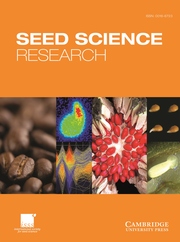Crossref Citations
This article has been cited by the following publications. This list is generated based on data provided by
Crossref.
Mazer, Susan J.
Moghaddasi, Arrash
Bello, Alexandra K.
and
Hove, Alisa A.
2016.
Winning in style: Longer styles receive more pollen, but style length does not affect pollen attrition in wild Clarkia populations.
American Journal of Botany,
Vol. 103,
Issue. 3,
p.
408.
Williams, Joseph H.
and
Mazer, Susan J.
2016.
Pollen—Tiny and ephemeral but not forgotten: New ideas on their ecology and evolution.
American Journal of Botany,
Vol. 103,
Issue. 3,
p.
365.
Takata, Jumpei
2016.
Handbook of Supernovae.
p.
1.
Lora, Jorge
Hormaza, José I.
and
Herrero, María
2016.
The Diversity of the Pollen Tube Pathway in Plants: Toward an Increasing Control by the Sporophyte.
Frontiers in Plant Science,
Vol. 7,
Issue. ,
Beekman, Madeleine
Nieuwenhuis, Bart
Ortiz-Barrientos, Daniel
and
Evans, Jonathan P.
2016.
Sexual selection in hermaphrodites, sperm and broadcast spawners, plants and fungi.
Philosophical Transactions of the Royal Society B: Biological Sciences,
Vol. 371,
Issue. 1706,
p.
20150541.
Labouche, Anne‐Marie
Richards, Shane A.
Pannell, John R.
and
Rafferty, Nicole
2017.
Effects of pollination intensity on offspring number and quality in a wind‐pollinated herb.
Journal of Ecology,
Vol. 105,
Issue. 1,
p.
197.
Mazer, Susan J.
Hendrickson, Brandon T.
Chellew, Joseph P.
Kim, Lynn J.
Liu, Jasen W.
Shu, Jasper
and
Sharma, Manju V.
2018.
Divergence in pollen performance between
Clarkia
sister species with contrasting mating systems supports predictions of sexual selection
.
Evolution,
Vol. 72,
Issue. 3,
p.
453.
Rosbakh, Sergey
Pacini, Ettore
Nepi, Massimo
and
Poschlod, Peter
2018.
An Unexplored Side of Regeneration Niche: Seed Quantity and Quality Are Determined by the Effect of Temperature on Pollen Performance.
Frontiers in Plant Science,
Vol. 9,
Issue. ,
Baskin, Jerry M.
and
Baskin, Carol C.
2018.
Pollen limitation and its effect on seed germination.
Seed Science Research,
Vol. 28,
Issue. 4,
p.
253.
Peters, Madeline A. E.
and
Weis, Arthur E.
2018.
Selection for pollen competitive ability in mixed-mating systems.
Evolution,
Vol. 72,
Issue. 11,
p.
2513.
Baskin, Jerry M.
and
Baskin, Carol C.
2019.
Effect of selective abortion on seed germination and post-germination performance of offspring.
Seed Science Research,
Vol. 29,
Issue. 3,
p.
210.
Li, Jinlu
Liu, Lu-Ning
Meng, Qingwei
Fan, Hai
and
Sui, Na
2020.
The roles of chloroplast membrane lipids in abiotic stress responses.
Plant Signaling & Behavior,
Vol. 15,
Issue. 11,
Pirasteh-Anosheh, Hadi
2020.
Breaking Seed Dormancy of Camelthorn (Alhagi maurorum) Using Different Treatments and Salinity Tolerance Threshold Level Evaluation at Germination Stage.
Iranian Journal of Seed Research,
Vol. 7,
Issue. 1,
p.
181.
Kaul, Veenu
and
Raina, Madhu
2020.
Reproductive Ecology of Flowering Plants: Patterns and Processes.
p.
245.
Beaudry, Felix E.G.
Rifkin, Joanna L.
Barrett, Spencer C.H.
and
Wright, Stephen I.
2020.
Evolutionary Genomics of Plant Gametophytic Selection.
Plant Communications,
Vol. 1,
Issue. 6,
p.
100115.
Williams, Joseph H
and
Oliveira, Paulo E
2020.
For things to stay the same, things must change: polyploidy and pollen tube growth rates.
Annals of Botany,
Vol. 125,
Issue. 6,
p.
925.
Pavel P. Gambaryan
and
Kuznetsov, A. N.
2021.
Gnetum and Nymphaeaceans as Models for a Scenario of the Origin of Morphotype of Flowering Plants.
Biology Bulletin Reviews,
Vol. 11,
Issue. 3,
p.
237.
Chen, Tingqiao
Xie, Mengyu
Jiang, Yumeng
and
Yuan, Tao
2022.
Abortion occurs during double fertilization and ovule development in Paeonia ludlowii.
Journal of Plant Research,
Vol. 135,
Issue. 2,
p.
295.
Khalaj, Hamideh
2023.
Evaluation of dormancy breaking and germination improvement methods in Althaea officinalis.
Journal of Seed Research,
Vol. 10,
Issue. 1,
p.
195.
Haghighatnia, Mohammadjavad
Machac, Antonin
Schmickl, Roswitha
and
Lafon Placette, Clément
2023.
Darwin's ‘mystery of mysteries’: the role of sexual selection in plant speciation.
Biological Reviews,
Vol. 98,
Issue. 6,
p.
1928.

